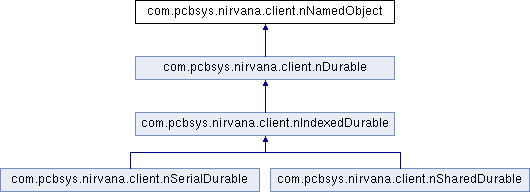- com
- pcbsys
- nirvana
- client
- nNamedObject

This class represents a client context on a RealmServer. More...

Public Member Functions | |
| void | ack (long[] eids) throws nIllegalArgumentException, nSessionPausedException, nSessionNotConnectedException, nRequestTimedOutException |
| Acknowledge multiple events in one server call. More... | |
| void | ack (long[] eids, boolean isSynchronous) throws nIllegalArgumentException, nSessionNotConnectedException, nSessionPausedException, nRequestTimedOutException |
| Acknowledge multiple events in one server call. More... | |
| long | getEID () |
| Returns the current event ID that this named context is bound to. More... | |
| long | getID () |
| Returns the unique ID of this client context. More... | |
| String | getName () |
| Returns the name of this client context. More... | |
| long | getOutstandingEvents () |
| Returns the number of outstanding events to be consumed for this durable object. More... | |
| boolean | isDurableObjectInvalid () |
| When a store is removed (or modified which entails a remove and create) then these logical representations can become invalid Once they are invalid you must perform a findChannel again on the nSession to acquire the latest object. More... | |
| boolean | isPersistent () |
| Returns if the durable names state is saved to disk on the server or not. More... | |
| boolean | isSerial () |
| If set the named object will queue multiple subscribers and send events to them in a serial fashion (events are processed in the order that they are published across all consumers). More... | |
| boolean | isShared () |
| If set the named object will queue multiple subscribers and send events to them in a round-robin fashion. More... | |
This class represents a client context on a RealmServer.
In as much as that if a client session is closed and sometime later a new client session is created by referencing this named object the client can resume where they were
| void com.pcbsys.nirvana.client.nNamedObject.ack | ( | long[] | eids | ) | throws nIllegalArgumentException, nSessionPausedException, nSessionNotConnectedException, nRequestTimedOutException |
Acknowledge multiple events in one server call.
The first argument contains all of the event IDs that you want to commit. This is functionally equivalent to calling nConsumeEvent.ack() for each event.
| eids | an array of the event IDs to be acknowledged. |
| nIllegalArgumentException | thrown if the event IDs were not consumed by this connection or if the named object is not shared. Also if this object has been invalidated and no longer can be utilised, this can occur if a delete request has been issued to the connected server. Some other conditions are if the event IDs were not consumed by this connection or if the named object is not shared. |
| nSessionNotConnectedException | we cannot write to the server if the session is not open |
| nSessionPausedException | we cannot write to the server if the session is not open |
| nRequestTimedOutException | the server did not respond within the time allocated |
| void com.pcbsys.nirvana.client.nNamedObject.ack | ( | long[] | eids, |
| boolean | isSynchronous | ||
| ) | throws nIllegalArgumentException, nSessionNotConnectedException, nSessionPausedException, nRequestTimedOutException |
Acknowledge multiple events in one server call.
The first argument contains all of the event IDs that you want to commit. This is functionally equivalent to calling nConsumeEvent.ack() for each event.
| eids | an array of the event IDs to be acknowledged. |
| isSynchronous | if true, the thread will be held until the server has responded to the request |
| nIllegalArgumentException | thrown if the event IDs were not consumed by this connection or if the named object is not shared. Also if this object has been invalidated and no longer can be utilised, this can occur if a delete request has been issued to the connected server. Some other conditions are if the event IDs were not consumed by this connection or if the named object is not shared. |
| nSessionNotConnectedException | we cannot write to the server if the session is not open |
| nSessionPausedException | we cannot write to the server if the session is not open |
| nRequestTimedOutException | the server did not respond within the time allocated |
| long com.pcbsys.nirvana.client.nNamedObject.getEID | ( | ) |
Returns the current event ID that this named context is bound to.
| long com.pcbsys.nirvana.client.nNamedObject.getID | ( | ) |
Returns the unique ID of this client context.
| String com.pcbsys.nirvana.client.nNamedObject.getName | ( | ) |
Returns the name of this client context.
| long com.pcbsys.nirvana.client.nNamedObject.getOutstandingEvents | ( | ) |
Returns the number of outstanding events to be consumed for this durable object.
| boolean com.pcbsys.nirvana.client.nNamedObject.isDurableObjectInvalid | ( | ) |
When a store is removed (or modified which entails a remove and create) then these logical representations can become invalid Once they are invalid you must perform a findChannel again on the nSession to acquire the latest object.
| boolean com.pcbsys.nirvana.client.nNamedObject.isPersistent | ( | ) |
Returns if the durable names state is saved to disk on the server or not.
| boolean com.pcbsys.nirvana.client.nNamedObject.isSerial | ( | ) |
If set the named object will queue multiple subscribers and send events to them in a serial fashion (events are processed in the order that they are published across all consumers).
| boolean com.pcbsys.nirvana.client.nNamedObject.isShared | ( | ) |
If set the named object will queue multiple subscribers and send events to them in a round-robin fashion.